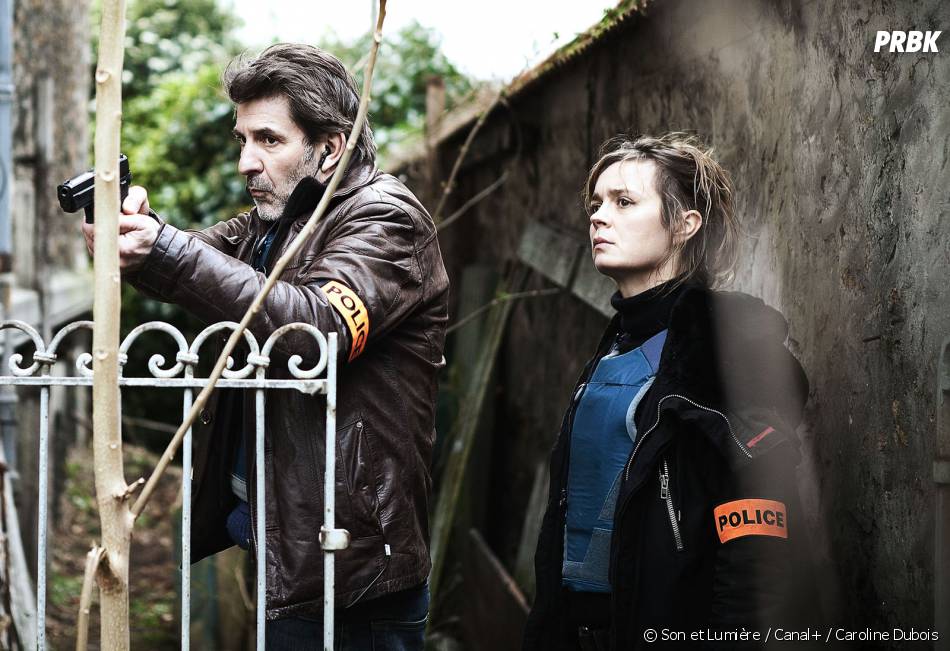The Footsteps of the Hunter
The Footsteps of the Hunter is now available through Cheshire Cat Books.
https://cheshirecatbooks.com
Footsteps of the Hunter (extract)
The opening of Footsteps of the Hunter – the new Kitty Lockwood novel.
A strand of spider web blows in the breeze, curling like a soft whip.
Hitting a rise, the bike lifts off, spokes spinning above the carpet of pine needles that cover the forest floor.
Two miles done. Three to go.
The wind hisses through the treetops. He hits a steady rhythm, heart and lungs working together. Serotonin and dopamine kick in, taking him to the happy place. His feet lift at each stride, light as air. Cares fade away as he weaves between the trees.
Ahead of him a branch creaks and a shadow swings between the pines.
The first thing Trevor sees is the feet. Purple, bloated flesh turning and swaying into his path. He rears back and the bike tumbles. His face hits the earth, left cheek nicked by a spur of tree root. Blood splashes his arm, runs down his skin and falls from his fingertips.
Trevor untangles himself from the bike and feels for the cut. Above him, the body twists on a length of thin blue twine. The man is naked. A man aged around thirty, Trevor guesses. The head is hunched over the shoulders. He forces himself to look at the face. Blowflies crawl between the stretched lips. The flesh is mottled, white and a shade of ripe mulberry. The cheeks are marked by scratches – claw marks, perhaps. Trevor struggles to his feet, holding out his hand just at the moment the wind pushes the body towards him. His fingertips brush the flesh.
‘Fuck!’ Trevor falls against a tree trunk. Sweat slips down his brow. He fumbles in the pouch strapped to his wrist, finds his phone and turns to make the call. The body twists at the edge of his vision.
‘Which service please?’
‘There’s a man. Hanging. He’s hanging from a tree.’
‘OK, sir. Is he breathing?’
‘He’s dead.’ Trevor bites his lip. He steals another glance at the body. ‘Nope. He’s topped himself. Definitely dead.’
‘Can you give me your name please, sir? And the number you’re calling from?’
Trevor gives the number. He bites his lip, anxious that he might laugh.
‘What’s your name, sir?’
‘Speed. Trevor Speed. Trevor Charles Speed.’
‘Thank you. Is it OK if I call you Trevor?’
‘Yes. Of course.’ ‘Thank you, Trevor. Now if you can just give me the address we’ll have someone with you as soon as possible.’
‘Address?’ Now the nervous laughter does spill out. ‘Tricky.’
‘As soon as you do that, Trevor, we’ll send someone to you.’
‘I’m on my bike. In the woods. There isn’t an address.’
‘Which wood, Trevor?’
‘It’s a forest. It’s Kielder forest. It’s fucking huge!’ *
Book club at Thought Foundation
I’m very chuffed that Cars Just Want to be Rust has been chosen as the subject for the very first book club session at the marvellous Thought Foundation in Birtley. You should soon be able to find details on the Thought Foundation website.
http://www.thoughtfoundation.co.uk
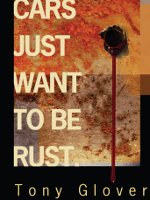
About me…
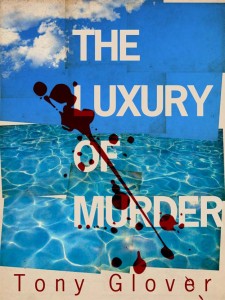 Tony Glover is a writer and film-maker, born in Northumberland.
Tony Glover is a writer and film-maker, born in Northumberland.
He has published two crime novels, Cars Just Want to be Rust and The Luxury of Murder.
The third book in the Kitty Lockwood series, Footsteps of the Hunter, is published in 2018.
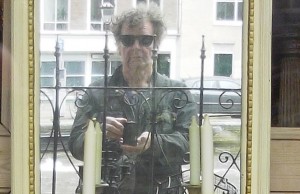
His radio play, Just a Trim, won a Sony
Radio Award and earned Tony the title of BBC North Playwright of the Year.
In 2007 he won the Northern Echo New Novelist of the Year award.
Irene’s Story, a film about bi-polar disorder, won a Millenium Award.
His film Posh Monkeys won a Royal Television Society award and was promoted by the British Council at the Angers, Munich, BAFTA, BP Expo and New York film festivals.
His stage plays include Chase Me I’m Chocolate, Slappers (staged at the Unity Theatre Liverpool) and The Stars that Surround Us (staged by Cloud Nine Theatre Company at Newcastle Playhouse). Sticky Fingers won the People’s Play award and was staged at the People’s Theatre.
Year of the Tiger was filmed by Wildcat Films for Yorkshire Tyne Tees.
I Want My Baby, devised and produced with young people from Greenfield Arts Centre in Newton Aycliffe, recently won an Impetus Award.
Tony was a visiting lecturer at the University of Northumbria from 2009. He has taught a variety of courses both undergraduate and MA. He currently teaches Creative Writing at the Hearth Arts Centre in Horsley, Northumberland.
Dropping Your Pants in Public
A friend once said to me ’Creating art is like dropping your pants in public. If you aren’t brave enough to do that, you should do something else.’
He was talking about making music, though the idea applies to writing too. In writing fiction your real personality ‘leaks through.’ Writers reveal themselves in their work. When I wrote Cars Just Want to be Rust one of my early readers said of the central character, Kitty Lockwood, ‘Well, she’s you, isn’t she?’ I was shocked. Had I simply invented my own avatar? Would all my prejudices and foibles be revealed? It’s that sort of fear which leads to self censorship. We all want to be loved. If not loved, then liked, or at least respected. We want to retain our dignity. We want friends to think we’re decent people. We’re warm, caring people who don’t make loud noises or frighten the horses.
So there is a temptation to stick to safe topics: to tailor the subject to the safe and acceptable. But self censorship is crippling. It hobbles a writer, preventing them from examining difficult subjects or creating characters who are repellent or weak. I was discussing Alan Bennett’s The History Boys with the writer Fiona Veitch Smith. ‘Of course, it couldn’t be produced now,’ she said. The central character of The History Boys is Hector, an eccentric teacher, who delights in knowledge for its own sake. But Hector is discovered sexually fondling a boy and his latent homosexual inclinations emerge. The teacher in the film version was played by Richard Griffiths. After the Jimmy Savile revelations, such a relationship is seen as sinister and predatory. The sympathy the audience feels for Hector would be tainted. There would be a temptation to write less than the truth.
When I worked in prisons I discovered that nobody considers themselves to be ‘evil’. While inmates allow they may have committed foolish, or regrettable crimes, they consider themselves to have been forced into such behaviour. I taught a young man who had run over a policeman who had forced him into it. ‘It was his fault! He was gonna arrest me!’ Real life villains such as Hitler or Radovan Karadzic look upon their crimes in a similar way – sad, but what else could they do? Even people who do evil things do not regard themselves as villains. Which is an important thing to bear in mind when creating your characters. Good people can do bad things: bad people can be sweet, merciful, even kind. Norman Bates and Hannibal Lecter are not rotten to the core – if they were that would be somehow less frightening. So don’t self censor – be brave – dare to explore the dark side. It does not mean you are evil. Writers are not the characters they create.
I was pitching radio play with a heroine who was a traveller. The producer said ‘I think we’d rather have such a play written by a member of the Romany community.’ That comment suggests that a writer can only create characters of which he or she has personal experience. So if you’re a woman, you can’t write about men. If you’re old, forget writing about children. Most stories we know would never have been written. J.M. Barrie, the author of Peter Pan, would not have created Captain Hook. Barrie, you see, was not a ’member of the pirate community…’
Engrenages
I’m very glad to see that the sixth series of the French crime drama, Engrenages (Spiral in the UK) is in production. It’s so well written and constructed. A set of sub plots is woven into a mystery which is resolved during the length of the series. The look is distinct, the acting superb. We care about these characters – Laure Berthaud (Caroline Proust), Gilou (Thierry Godard), Tintin (Fred Bianconi), Judge Roban (Philippe Duclos), even the crooked lawyer, Josephine Karlsson ( Audrey Fleurot) engages our sympathy. These are flawed characters, living and working in a grubby, corrupt world where the political and the criminal worlds mesh and entwine. Yet the respect and affection between the members of the team is just as real, just as authentic as the betrayals and double dealing. I love the series and the way it combines the political world with crime drama is an inspiration.
Inspiration versus Perspiration
When someone asks me what I do I mumble that I’m a writer. Sometimes the next question is the brain twisting ‘So have you written anything I’ve read?’ But the most common question is ‘Where do you get your ideas?’ My answer is ‘Out of my head.’ But finding ideas when they don’t make a spontaneous appearance is something which interests me.
Writing a story in any medium is a journey. I have a few ways to find the tricky first step.
1) People watch. Observe people without judgement. Try to empathise, however unappealing you may find them. Few people believe they are evil, or venal, or corrupt. They find a way to justify their behaviour. Speculate. Try to look into their past and imagine how they got to be the person they are. What was their childhood like? Which events formed their worldview and shaped their character?
2) Setting. I return to some places time and again in my mind’s eye. I often picture a grove of trees in Durham ; a street in Sienna, a rooftop flat in the Marais. I have no idea why these places come to mind – perhaps they resonate with events that took place there. You will have similar places in your own mind’s eye. Write down notes about these evocative settings. Try to capture the way these places affect your senses – sight, sound, scent, touch and, if it’s appropriate, taste.
3) Listen to music. I find instrumental music to be the best – I can’t have anyone cluttering up my mind with their words – it gets in the way! I need access to the voice in my head. So I listen to Miles Davis’ Kind of Blue or Sketches of Spain. Another favourite is the guitar playing of Django Reinhardt or Julian Bream – something like Recuerdos de la Alhambra. If it must have words, then something like Bailero from “Chants d’Auvergne” by Joseph Marie Canteloube – nice tune and I haven’t a clue what they’re singing about. For the same reason I listen to FIP Radio – good music, but the DJs talk in French, so it’s not distracting.
4) Keep a notebook close to hand. Carry one and keep one by the bed. If you can’t find one, write your idea on a napkin or fag packet. Otherwise, you’ll forget it….
5) Tell yourself a story while you are falling asleep.
6) Write about your passions. Why do you enjoy collecting socks or extreme ironing? Think of your hero or heroine. Give them a similar passion.
7) Freewrite. Choose a subject and write continuously for a while without lifting your pen from the page. Don’t worry about spelling, punctuation or grammar. Don’t censor yourself – just write. This way you access your subconscious and often surprise yourself, discovering ideas you didn’t know you had.
8) Walk. It’s so important to switch off the everyday concerns and access your mind’s alpha state. There is something about the rhythm of walking which does this. I find it helps if you are blocked.
For example, you may have a great beginning but don’t know how to end the story. Stories are circular. The central character will end up in the same place – geographical, physical, situational – but everything will have changed. They possess new knowledge, or skills, or have been changed in some way. Walking frees the mind and allows you to examine all the possibilities. Write them down.
Before they float away…


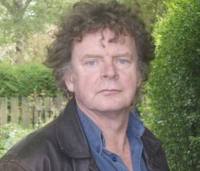 Some years ago I played sax and congas in a band called the Sabrejets. We used to carry our kit around in an old blue ambulance that once belonged to the NHS Blood Transfusion Service. We would gig in Teesside or North Yorkshire and drive back to Newcastle, often late at night, the kit stashed in the back, along with two of the band, drummer Sandie La Rocque and guitar/vocalist Carlos ‘Fiery Gob’ Magee. Three of us used to sit in the front of the van – my brother Chris (aka Kid Glover), Martin Craig (aka Diesel La Fume) and myself, at the wheel – (aka Antoine Legris).
Some years ago I played sax and congas in a band called the Sabrejets. We used to carry our kit around in an old blue ambulance that once belonged to the NHS Blood Transfusion Service. We would gig in Teesside or North Yorkshire and drive back to Newcastle, often late at night, the kit stashed in the back, along with two of the band, drummer Sandie La Rocque and guitar/vocalist Carlos ‘Fiery Gob’ Magee. Three of us used to sit in the front of the van – my brother Chris (aka Kid Glover), Martin Craig (aka Diesel La Fume) and myself, at the wheel – (aka Antoine Legris).